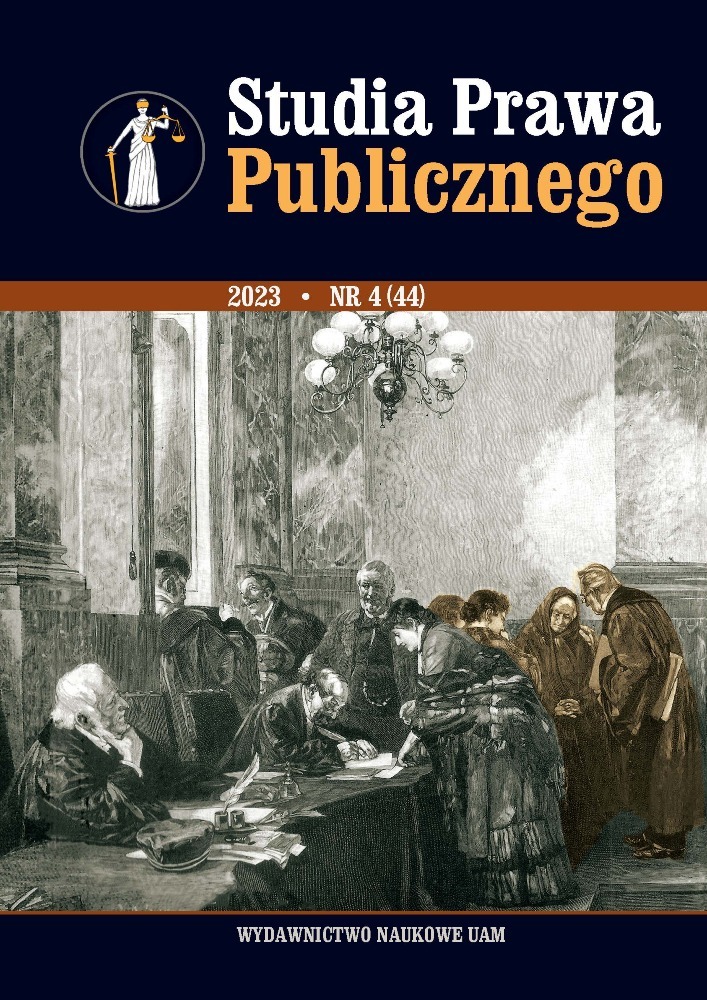Abstrakt
The article reflects on the issue of the research method in public economic law. In the first part, the concept of science is explained, which can be understood as a process consisting in the systematised pursuit of knowledge of the truth for idealistic or utilitarian purposes. The starting point is K. Jaspers’ definition, according to which the concept of science contains three elements: methodical cognition (1), certainty of knowledge (2), universal validity (3). Each of the elements indicated is then considered. Methodical cognition is to be distinguished from thought. The former is cognition of reality presupposing an awareness of the research method and its limitations. The latter is driven by intuition. The use of the method should be strongly linked to the research objective. The author then refers to the second defining element: certainty in the science of law. In his view, certainty is sought in answers to questions about the content of the law in force. Secondly, certainty is sought in the criteria evaluating the law and the results of this evaluation. The third element, i.e. universal validity, is related to the generally accepted methods of interpretation and the fundaments of law lying in human rights and the human dignity that is their source. The second part of the paper focuses on defining the research objective and the adequacy of the method, referring to the dogmatic, historical and comparative methods that should aim at determination the law in force and its evaluation. In the third part of the article, a proposal for a research method in public economic law is presented, which consists of three elements: presenting the context of the research objective, applying the dogmatic method, and evaluating the law in force. In the last part, attention is drawn to the need for uprightness of life, and therefore ethos, as a condition for the ability to recognize what is just.
Bibliografia
Alexy R., Teoria praw podstawowych, tłum. B. Kwiatkowska, J. Zajadło, Warszawa 2010. Arystoteles, Etyka nikomachejska, tłum. D. Gromska, Warszawa 2012.
Bator A., Czy istnieje prawo gospodarcze?, „Ruch Prawniczy, Ekonomiczny i Socjologiczny” 1993, nr 55(1), s. 2–6.
Chełmoński A., Co to jest prawo gospodarcze?, „Ruch Prawniczy, Ekonomiczny i Socjologiczny” 1993, nr 55(1), s. 7–9.
Eliot T.S., Kto to jest klasyk i inne eseje, tłum. M. Heydel, M. Niemojewska, H. Pręczkowska, M. Żurowski, Kraków 1998.
Hervada J., Prawo naturalne. Wprowadzenie, Kraków 2011.
Holz F., Kirchmann, Julius von, w: Neue Deutsche Biographie, t. 11, Berlin 1977, s. 654– 655, https://www.deutsche-biographie.de/pnd118841726.html#ndbcontent (dostęp: 12 VII 2023).
Jaspers K., Idea uniwersytetu, tłum. W. Kunicki, Warszawa 2017.
Lande J., Sprawa teorji prawa, „Głos Prawa” 1933, nr 10(7–8), s. 377–391. Longchamps F., Z problemów poznania prawa, Wrocław 1968.
Longchamps de Berier F., Być prawnikiem. Trzy medytacje, Warszawa 2023. Morawski L., Wstęp do prawoznawstwa, Toruń 2006.
Newman J.H., Idea uniwersytetu, tłum. P. Mroczkowski, Warszawa 1990. Peretiatkowicz A., Cezaryzm demokratyczny a konstytucja, „Ruch Prawniczy, Ekonomiczny i Socjologiczny” 1929, nr 9(4), s. 367–376.
Platon, Państwo, księga I VIE lub 331 in fine, tłum. W. Witwicki, Kęty 2003.
Rabska T., Jakie prawo gospodarcze? – próba odpowiedzi, „Ruch Prawniczy, Ekonomiczny i Socjologiczny” 1993, nr 55(1), s. 19–25.
Rabska T., Pozycja samorządu terytorialnego w Konstytucji, „Ruch Prawniczy, Ekonomiczny i Socjologiczny” 1995, nr 57(2), s. 41–56.
Rabska T., Refleksje nad nauką prawa gospodarczego, „Roczniki Nauk Prawnych” 2011, nr 21(1), s. 267–276.
Rabska T., Refleksje nad ustrojem – państwo obywatelskie czy partyjne?, „Studia Prawa Publicznego” 2016, nr 4(16), s. 171–186.
Szafrański A., Prawo energetyczne. Wartości i instrumenty ich realizacji, Warszawa 2014. Szydło M., Pojęcie nauki i osiągnięć naukowych w postępowaniach awansowych w nauce (uwagi z perspektywy nauk prawnych), „Państwo i Prawo” 2022, nr 5, s. 52–67.
Szymik J., Traktat o Bogu Jedynym, w: Dogmatyka, t. 3, pod red. E. Adamiak, A. Czai, J. Majewskiego, Warszawa 2006. s. 14–180.
Święcicki M., Jak studiować? Jak pisać pracę magisterską?, Warszawa 1971. Ziembiński Z., Problemy podstawowe prawoznawstwa, Warszawa 1980.
Ziembiński Z., Szkice z metodologii szczegółowych nauk prawnych, Warszawa–Poznań 1983.
Licencja
Prawa autorskie (c) 2023 Adam Szafrański

Utwór dostępny jest na licencji Creative Commons Uznanie autorstwa – Bez utworów zależnych 4.0 Międzynarodowe.

